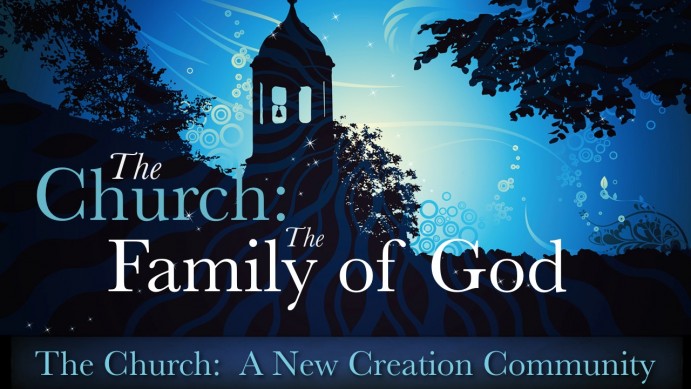
Before the pandemic, I attended many mega events, and I saw people really on fire for God. Stadiums were packed full, miracles took place, and people went home with a good feeling in their hearts. It wouldn’t be fair if I didn’t admit that this is a good thing in itself. Yet underneath it all, there is also a danger. With the dwindling of such events to keep people on fire, church attendance has dropped below that of pre-pandemic times. A large number of Christians have gone cold and stopped attending church altogether.

This is, in fact, not a new situation; the pandemic has just caused it to intensify. Even before the pandemic, I met people who identified as Christians yet seldom went to church. Some claim they have busy schedules. Others claim they feel lonely in church or the message seemed dated and lacked inspiration. Some are exhausted by the focus of churches on programmes. It seems to me that many people do not really understand what churches are about.
Modern-Day Perception of Churches
If we examine honestly our perception of churches when we were young Christians, we might come to certain discoveries. These used to be how many people new to the faith view churches. Some still do so today:
As an organization: ‘Churches have a leadership board who make the decisions. The vision and purpose of the church are made by the ultimate leader of the church. Congregation members can voice concerns, but ultimately have to obey their leaders.’ While this is true of all organisations, such a viewpoint emphasises hierarchy and obedience, not necessarily a sense of belonging.
As a ‘Social Club’: There are some who think, ‘If you want to be a part of the church, you have to adopt a certain “code”. You are supposed to dress a certain way, worship a certain way, and think a certain way‘. Again, such a viewpoint puts a wall in front of a person rather than fostering a sense of belonging.
Whether these are correct perceptions or not, these types of understanding frighten people. Yet, even among people who do make attempts to go to church, many might not have a complete comprehension of what churches are:
- As a religious building: It is the place where Christians worship God.
- As hospitals: It is the place where emotional, medical, or spiritual wounds are healed.
- As schools: Churches provide affordable education for kindergarten children or for the less-advantaged.
- As social clubs: Church is where I can express myself in wholesome music, or take part in activities with like-minded friends.
Most of these are blessings that God has bestowed on His people. Many are also essential and meaningful functions of churches. However, the problem comes when we have a limited perspective. People inevitably end up disappointed if churches have failed them in any of these areas. If we really want to understand what church is about, we need to examine it in the light of what it meant to Christ’s followers during His day.
The Early Church
While healing, education, and a sense of belonging flourished in the Early Church, they did so in circumstances that were extremely challenging. One could say that all these things thrived despite the circumstances.
The early followers of Christ did not have the advantage of great musical bands. Many of the prophetic exhortations were not about wealth and earthly comfort, and they were a minority despised by the mainstream culture. Many did not even have an allotted building to meet in. Nevertheless, the early Christians possessed an understanding of what church is.

Churches play multiple roles in society; they serve as a place of worship, places of joy and comfort, healing centers, schools, and a place where we can truly belong. Where can we find all these built into one? When all of these come together, they form communities. Jesus spoke about this when He said the Church is the Body of Christ.
Churches are foremost communities. Additionally, because God has set us apart, we have a unique collective identity within that community. Because our unique collective identity is established by God and through Christ, our focus as a Church must be upon Christ and God. Even today, churches that understand this almost invariably grow rapidly.
Why Do We Go To Church?
Paul refers to the Early Church through the Greek Word ekklesia, a word which occurs in the New Testament a total of 115 times. Generally, ekklesia in the Classical Greek was used to refer to “an assembly of citizens summoned by the crier, the legislative assembly”. The word, as used in the New Testament, is taken from the root of this word, which simply means to “call out.”

Because I intend to keep things simple, I will not go into this, but certain connotations are clear. However, I feel we do need to understand the chief foundation of churches. Why do we go to church? The primary reason must be as an act of obedience to God, who has called us out to Him.
Among the higher-listed commandments that God handed to His people through Moses was one about keeping the Holy Sabbath. This commandment was listed just below the ones concerning the Lord Himself. Jesus Himself showed an example to us in Luke 4:16:
16 When he came to the village of Nazareth, his boyhood home, he went as usual to the synagogue on the Sabbath and stood up to read the Scriptures.
Why does God place such importance on this? In Hebrews 10:25, Paul urges the early church not to neglect [their] meeting together, as some people do, but encourage one another, especially now that the day of the Lord’s return is drawing near.

Paul recognizes that when we are born-again as Christians, it is no longer just about us. We are now a part of the Body of Christ, also known as the Family of God. Like all good and strong families, each member in the Family of God is inter-dependent upon the others. This reflects a true unity, and what happens to one member of the Body should affect the other members of the Body. We must look beyond ourselves when we go to church.
Acts 2:44-46 gives us a picture of what the church is really all about:
And all the believers met together in one place and shared everything they had. 45 They sold their property and possessions and shared the money with those in need. 46 They worshiped together at the Temple each day, met in homes for the Lord’s Supper, and shared their meals with great joy and generosity — 47 all the while praising God and enjoying the goodwill of all the people.
And each day the Lord added to their fellowship those who were being saved (Acts 2:47).
Understanding this context, when we go to church, let it be out of a heart of obedience to God. It has to be a holistic thing, including the difficult parts like disciplining ourselves. Let us prioritize what is truly important in God’s eyes, that we are really going because we consider ourselves as part of the Family of God.

Church is where we worship God, and it is also where we learn to be accountable to others in God’s family, where we receive the preaching of the Bible that will help set the direction for our lives, where we can learn to define what we believe, and where we can have an outlet to serve others beyond ourselves.
It is where we learn what it is to be a people of God, love our brothers and sisters, and be loved in return. It is being part of a community where we truly belong.
|Share The Good News|




Leave a Reply